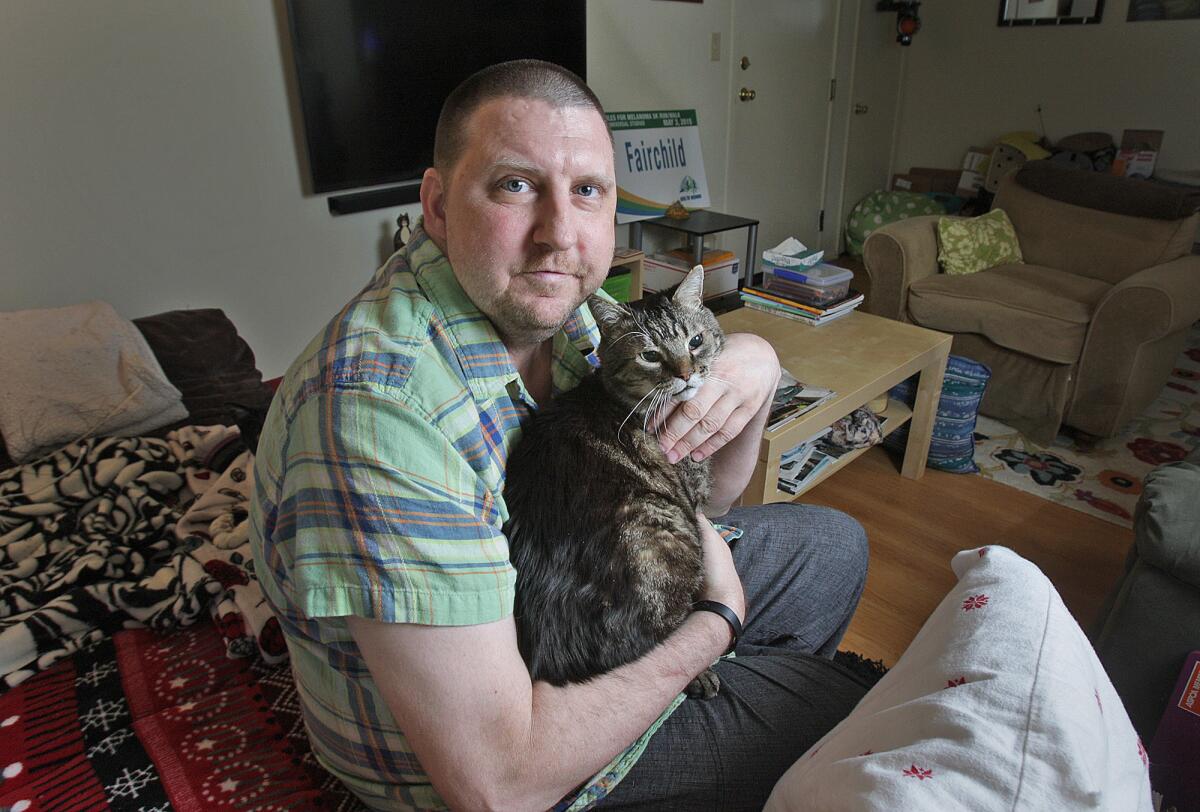As California’s aid-in-dying law takes effect, a Burbank man battling cancer sees a new path

Matt Fairchild with his cat Jacques in his living room in Burbank in March 2016. Fairchild has melanoma, a skin cancer that has resulted in tumors in his brain.
The controversial End of Life Option Act will go into effect on Thursday, ending the wait for many terminally ill Californians who are seeking to take their mortality into their own hands.
However, one Burbank resident sees that day as the start of a new countdown — how fast a dying patient can get their aid-in-dying medication.
Matt Fairchild has been waiting for Thursday to arrive because now he can see if the legislation he has been advocating for will work as intended or require modifications. Though he’s not going to request the medication at this point, he’s glad that others will be able to do so if they wish.
NEWSLETTER: Stay up to date with what’s going on in the 818 >>
The process to obtain the life-ending drug is no simple task. Multiple written and verbal requests need to be made and can take weeks or months to gain approval. Several physicians must be consulted to ensure that no other medical treatment can be done for the patient. Additionally, ill patients must have the mental capacity to administer the drug themselves.
“A sick person that’s dying could bring it up with their doctor. But after that, it’s them and their caregiver and their doctor’s job to move [the request] forward and check all the boxes that need to be checked so you can secure that medication,” Fairchild said.
You can’t get down about it because you’d be down all the time. You just kind of accept it, go forward and do what you need to do to try and enjoy what time you have.
— Cancer patient Matt Fairchild
“You would want to do it, hypothetically, the day you go into hospice. You would want that medication on your shelf because you’ve stopped treating your cancer, which means at any point your cancer can take hold of you and start to do things that are unpleasant,” he added.
Fairchild, 46, a Navy and Army veteran, was diagnosed with melanoma, the most serious form of skin cancer in August 2012. For the last two years, he has been living with stage IV of the disease and his situation has not gotten better.
Since April, Fairchild has learned that he has cancer near his tailbone, and two tumors in the back of his brain are continuing to grow.
As he described his worsening symptoms and the technical aspects of his condition, Fairchild remained calm and collected.
“Things aren’t going to get better,” he said. “I imagine things will get worse. I would say they would get worse before they get better, but it’s not like there’s any indication that they’ll get better. You can’t get down about it because you’d be down all the time. You just kind of accept it, go forward and do what you need to do to try and enjoy what time you have.”
Though Thursday signifies the first day terminally ill patients can request the aid-in-dying drug, Fairchild said there is still a long battle ahead of him, so he will try every treatment that is available to him and live as long as he can.
But when the day comes when no medication or treatment will help him, Fairchild said he will start the paperwork to obtain the drug.
--
Anthony Clark Carpio, [email protected]
Twitter: @acocarpio
